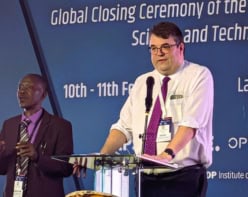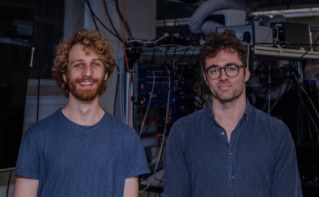While the technological applications of quantum mechanics are bright, its meaning remains opaque. Thankfully, as Robert P Crease explains, philosophers of science are working on it

The late theoretical physicist Steven Weinberg once wrote an essay entitled “The trouble with quantum mechanics”. Published in the New York Review of Books in 2017, it lamented the fact that “physicists who are most comfortable with quantum mechanics do not agree with one another about what it all means”. Weinberg’s statement seems paradoxical. If physicists are so untroubled by quantum mechanics, why squabble over its significance?
Most other branches of physics do not experience this problem. Even where there is uncertainty, physicists assume that any mysteries – the fine details of, say, superconductivity – will be cleared up with more physics. But quantum mechanics is different. No amount of physics can dispel oddities like Schrödinger’s cat being neither dead nor alive before being observed, or single electrons creating interference patterns in the double-slit experiment.
Philosophers of science are pursuing at least three approaches to these puzzles
Philosophers of science are pursuing at least three approaches to these puzzles. The first investigates how (and why) quantum mechanics seems to contradict our assumptions and habits about what humans can know. The second examines the origins of quantum mechanics: how and why physicists had to build such a perverse theoretical structure in the first place. Finally, philosophers are looking at whether we should modify our assumptions about knowledge so we can agree on what it all means.
Puzzles and puzzling
The first approach involves analysing the mismatch between quantum mechanics and our expectations of a physics theory. This tactic ignores the historical path that led physicists to develop quantum mechanics. Instead, it studies the logic of the formalism they produced and how it collides with that of classical mechanics. Can we, this approach asks, reconcile the two formalisms by gaining a better understanding of the terms and structure of quantum mechanics?
Unfortunately, we cannot reconcile them if we assume that a pre-formed reality exists “out there” independent of human thought. What’s more, preserving this notion of “realism” comes at a cost. As the Dartmouth College philosopher Peter J Lewis put it in his book Quantum Ontology: a Guide to the Metaphysics of Quantum Mechanics: “Any attempt to reproduce the predictions of quantum mechanics using physical properties will result in ascribing contradictory physical properties to the system”. The price of preserving realism is, in other words, contradiction or mystery.
By clearly distinguishing between two contexts – the discovery and the logic of quantum mechanics – this first approach pinpoints why we have so much trouble with its meaning. It also prepares us to appreciate the significance of the second approach, which combines those two contexts in examining why physicists a century ago found themselves forced to create a formalism whose meaning they still can’t agree on.
In The Structure of Scientific Revolutions, the philosopher and historian Thomas Kuhn drew a sharp distinction between “normal science”, which turns up results that fit snugly with the rest, and “revolutionary science”, in which the findings are puzzling and force us to change our “paradigm” before they fit in. The two paradigms are so discontinuous, Kuhn said, that scientists have to make a conceptual leap from one to the other. In fact, he treated the switch from classical to quantum mechanics as emblematic of this paradigm change.
But in her 1999 book Quantum Dialogue: the Making of a Revolution, the philosopher and historian Mara Beller detected something different in the papers, correspondence and reflections of the founders of quantum mechanics. They didn’t make conceptual leaps from classical to quantum mechanics, she found, but instead engaged in an “intricate flux” of dialogue. It was only through “openness, selective borrowing and communication”, Beller wrote, that they forged a collective conceptual shift. In fact, she viewed quantum mechanics as the most dramatic example of how this type of shift has happened in science.
Finally, the third philosophical tradition unearths a path that addresses the question of meaning more directly. In an essay in the 2020 book Phenomenological Approaches to Physics, the French philosopher Michel Bitbol argues that it is hopeless trying to mine “the elusive depths hidden behind phenomena” for a way to represent the quantum world. More promising, he finds, are approaches such as QBism.
QB or not QB – that is the question for quantum physicists and philosophers
QBism views the data obtained by measurements of quantum states as reflecting not real states of affairs that exist “out there” prior to measurement, but as “subjective” probabilities orienting the experimentalist’s thinking. QBism treats the Born rule, for instance – the probability that an experimentalist will measure a quantum system with a certain result – not as prescriptive but as a guide to their decision-making about what to expect.
What disturbed Steven Weinberg was that the breakdown of meaning was happening in his own part of physics, which is supposedly concerned with fundamental knowledge
This approach, which the physicist Chris Fuchs of the University of Massachusetts calls “participatory realism”, successfully dispels many of the traditional puzzles and paradoxes in the interpretation of quantum mechanics that make it so at odds with conventional expectations. It copes with the lack of realism, not by studying what we have to give up to keep it, or why we were forced into it, but by revising what it means to know the quantum world at all.
The critical point
What disturbed Weinberg most was that the breakdown of meaning was happening in his own part of physics, which is supposedly concerned with fundamental knowledge. Philosophy, as a field, ought to be able to help, because it focuses on another kind of fundamental knowledge – on meaning, and on exploring and clarifying cases of its breakdown. But philosophers may be learning as much as physicists. As Bitbol has said, a precondition of finding quantum mechanics meaningful, is nothing less than a “revolution in our conception of knowledge”.




